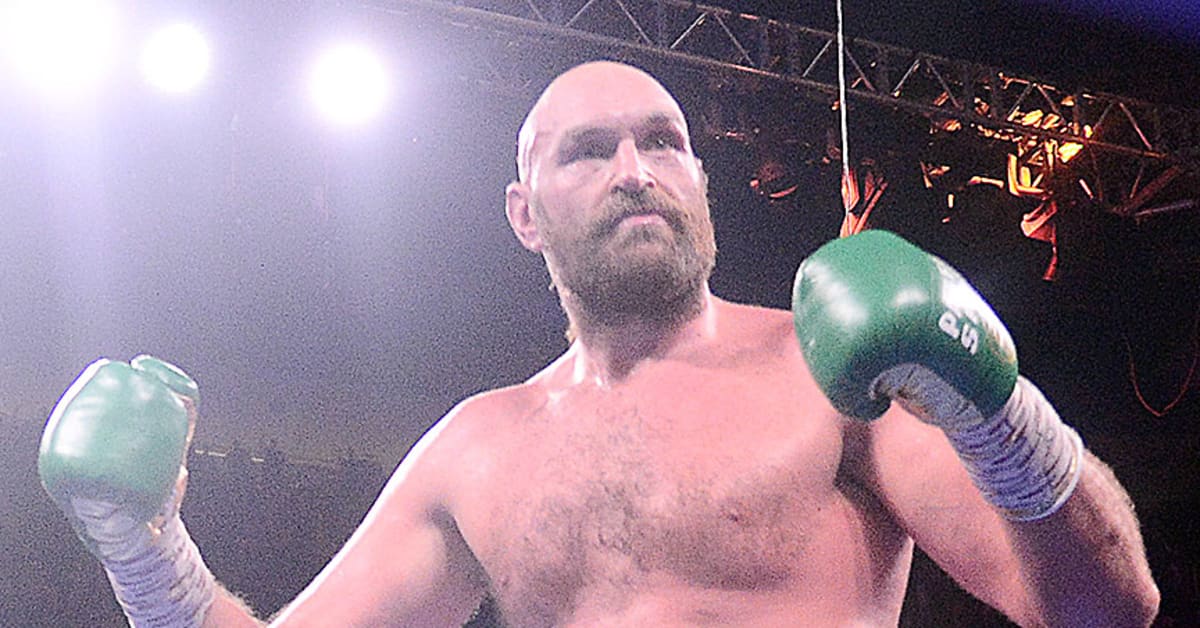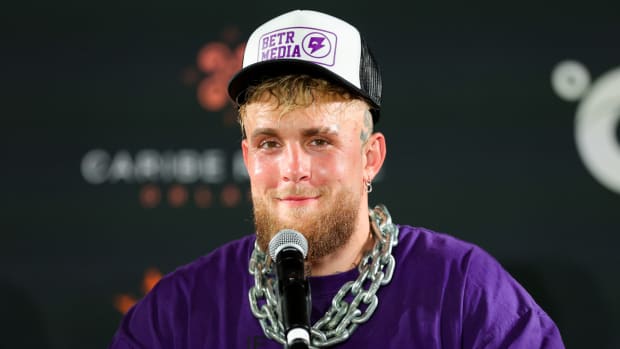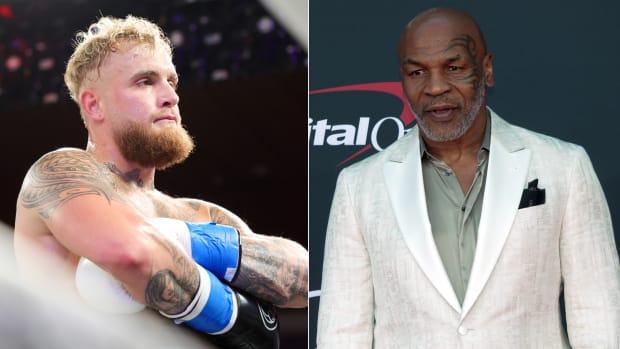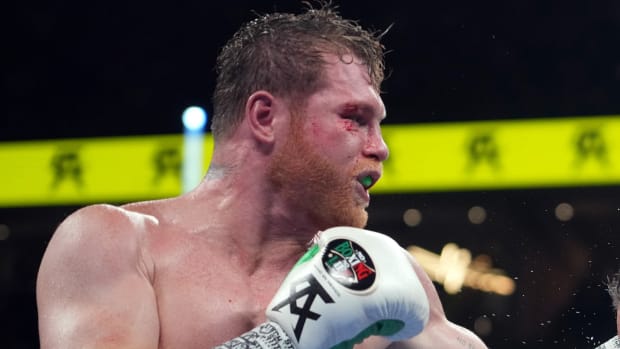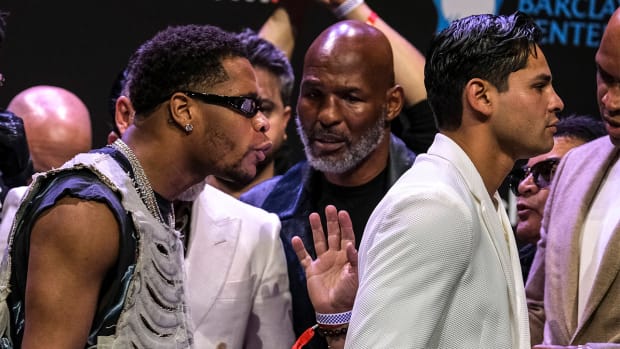Best Heavyweight in the World: Tyson Fury Beats Deontay Wilder Again in Thrilling Fight
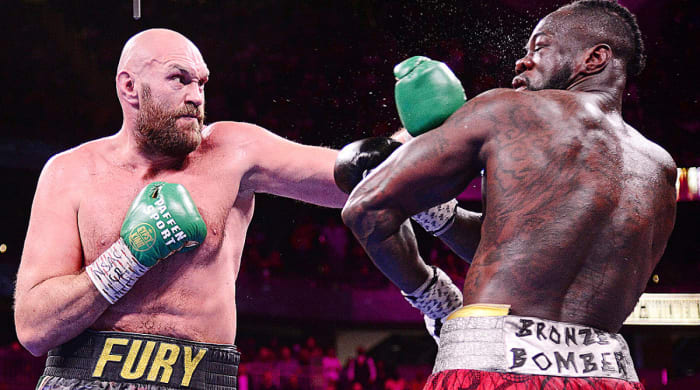
Tyson Fury, who is now 31-0-1 in his career with 22 knockouts, led on all three scorecards (95-91, 94-92, 95-92) at the time of the stoppage in the 11th round.
Joe Camporeale/USA TODAY Sports
LAS VEGAS – Late Saturday, nearly an hour after yet another dominating knockout win over Deontay Wilder, Tyson Fury, bare chested, folded his 6-foot-9, 277-pound frame onto a padded chair. His belt, the WBC title, was wrapped around his ample waist. A red trucker hat was tilted back on his head. A pair of unlabeled tube socks ran up his calves.
He looked like the kind of slob you might see stumbling out of a Vegas strip club.
He is the best heavyweight in the world.
What a night. What a fight. It was hard to know exactly what to expect when Fury and Wilder tangled for the third time. It had been 20 months since Fury stunned boxing by stopping Wilder in the seventh round, ending Wilder’s five-year title reign. Since then there have been lawsuits, two battles with COVID-19 and enough stinging trash talk to make anyone uncomfortable. Wilder changed trainers. Fury packed on weight. When the first bell rang, any outcome seemed possible.
The most likely—Fury picking up where he left off in February 2020—seemed to play out early.
Wilder promised to showcase new skills, and he did in the first round, peppering Fury to the body. He did it again in the second, following up jabs to the midsection with stiff right hands.
In the third, though, Fury adjusted. A right hand to the side of Wilder’s head with 35 seconds left in the round stung him, and an uppercut sent the ex-heavyweight champ to the mat. Fury looked strong. Wilder looked gassed. It took nearly seven rounds for Fury to finish Wilder last fight. This one looked like it was set to end quicker.
Round-by-round analysis of Fury-Wilder III
And then it didn’t. A thudding right hand by Wilder in the fourth wobbled Fury. A couple of grazing punches sent him to the canvas. Seconds later, a short right hand by Wilder put Fury down again. Suddenly Wilder seemed poised to finish the fight.
Only he didn’t. Much was made of Wilder’s condition coming into this fight. He weighed in at a career-high 238 pounds, seven pounds heavier than he was for the last fight. He claimed the weight, most of which was added to his upper body, would make him more durable. But boxing success isn’t built on muscle. Wilder wasn’t a premier knockout artist because of his size—he routinely fought under 220 pounds, including in the first fight with Fury—but his speed. Muscle is great, but it’s heavy. And extra weight can make you tired.
It didn’t help Wilder that Fury, one of boxing’s smartest fighters, knows how to use his weight. There are few fighters Wilder, at 6-foot-7, has to look up to. Fury is one of them. And a tactic Fury often employs is to drape his entire body over opponents during clinches, forcing them to hold him up. It’s exhausting, and by the end of the third round Wilder looked gassed.
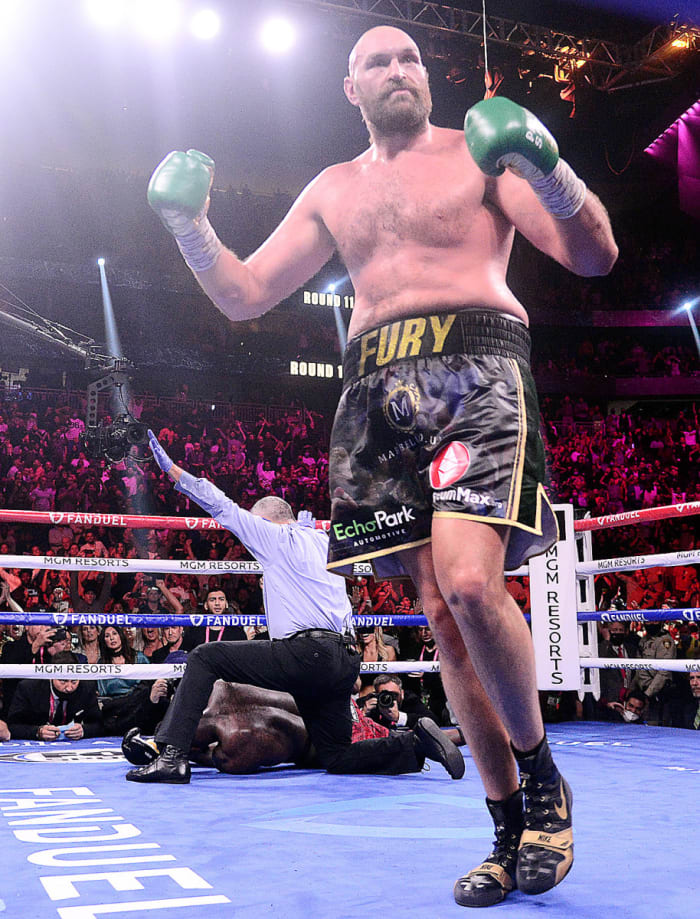
Tyson Fury bounced back to knock out Deontay Wilder after being knocked down himself twice in the fourth round.
Joe Camporeale/USA TODAY Sports
Conditioning likely stopped Wilder from capitalizing on his success in the fourth round, and Fury took advantage. With his trainer, Sugar Hill, in his ear, Fury went back to the jab, backing Wilder up with it, using it as a range finder to land right hands over the top in the fifth and sixth. He unleashed a brutal attack on Wilder in the seventh, bombarding him combinations, battering him with heavy body shots. Wilder had his moments—after getting knocked down for the second time in the tenth round, Wilder rallied to land several big punches on Fury before the end of the round—but the pop in his punches, potent early, had lost a lot of steam.
In the 11th, it was over. It probably should have been over before then, but Malik Scott, who took over Wilder’s corner after Wilder fired trainer Mark Breland after Breland threw in the towel in the last fight, was not about to end it, and referee Russell Mora saw just enough from fight from Wilder to stay away. Wilder wanted to go out on his shield. And he did. In the middle of the 11th, Fury backed Wilder into the ropes. A left hook clipped Wilder’s chin. A right hand connected cleanly on the side of his head, sending a beaten Wilder careening to the canvas.
It ended Wilder’s night.
It was the kind of “crunching right hand,” says Fury, “that ends careers.”
Indeed. Wilder had a lot riding on this fight. He had spent the months following the first loss to Fury pushing conspiracy theories. He accused Fury of loading his gloves. He accused Breland of spiking his water. This fight, Wilder vowed, would be different. He had Scott, a longtime sparring partner with whom he shared a strong bond. He had a new game plan. Months of preparation. More than once, Wilder scoffed at the idea that Fury could knock him out.
But he did, and he did it while delivering the kind of beating that rivaled the one Wilder took from Fury the last time. Wilder, who left the ring without giving a post-fight interview, told a P.R. staffer, “I’m not sure what happened.” Said Wilder, “I did my best, but it wasn’t good enough tonight. I know that in training he did certain things, and I also knew that he didn’t come in at 277 pounds to be a ballet dancer. He came to lean on me, try to rough me up and he succeeded.”
Wilder can come back. But will he? He’ll be 36 later this month. He has made more than $100 million in his career and will likely cash a check in excess of $20 million for this fight. A fourth fight with Fury isn’t happening. “He’s a sore loser,” Fury said. “The saga is done—done for good.” A rebuild could be long, and it’s no certainty Wilder will make it back to this level. Does Wilder really want fights against Robert Helenius or Andy Ruiz? Or will retirement be more appealing?
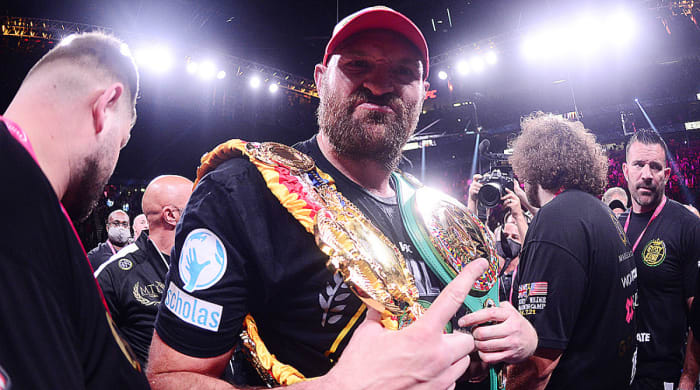
Tyson Fury is next primed for a mandatory showdown with British challenger Dillian Whyte.
Joe Camporeale/USA TODAY Sports
“He took a lot of punishment tonight,” says Fury, “and that puts a lot of mileage on the clock. I hope that he’s OK … we’ll see what he can do in the future.”
Fury’s future is much rosier. The 33-year-old plans to take the rest of the year off, citing the six months he has largely been away from his family. But when he returns, there are appealing options. Dillian Whyte, a heavy-handed British heavyweight, is Fury’s mandatory challenger, and Fury-Whyte will be a huge event in the U.K. After that, the winner of Anthony Joshua’s rematch with Oleksandr Usyk will be eager to face Fury, setting up an undisputed heavyweight championship fight.
The last two years have been big for Fury. The next two could be bigger. As Fury wrapped a post-fight press conference, he looked over at his co-promoter, Frank Warren. “Not bad for a feather duster,” said Fury. “A non-puncher. That was a clean, one-punch knockout.”
Tyson Fury is the best heavyweight in boxing. The baddest, too.
